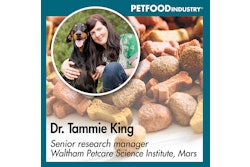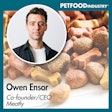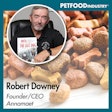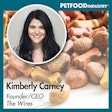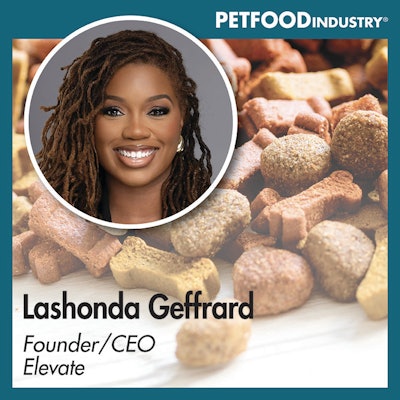
In this episode of Trending: Pet Food, host Lindsay Beaton sits down with Lashonda Geffrard, founder and CEO of Elevate (formerly the Black Pet Business Network), to explore what diversity really means in the pet food industry. They discuss the economic benefits of authentic diversity, the difference between performative and genuine inclusion efforts, and the current challenges facing diversity, equity and inclusion initiatives in corporate America. Geffrard shares insights on how companies can move beyond surface-level diversity to create meaningful change that benefits both their bottom line and their communities, while offering practical advice for businesses ready to make diversity a true priority.
In Episode 90 of Trending: Pet Food, host Lindsay Beaton sits down with Lashonda Geffrard, founder and CEO of Elevate, to explore what genuine diversity looks like in the pet food industry and why it's crucial for business success. The conversation covers the difference between performative and authentic inclusion efforts, plus practical steps companies can take to create meaningful change. You can find the episode at Trending: Pet Food Podcast, on SoundCloud or on your favorite podcast platform. This episode originally aired on July 9, 2025.
We want to thank AFB International for sponsoring this podcast. AFB is the premier supplier of palatants to pet food companies worldwide, offering off-the-shelf and custom solutions and services that make pet food treats and supplements taste great.
Lindsay Beaton, editor, Petfood Industry magazine and host, Trending: Pet Food podcast: Hello and welcome to Trending: Pet Food, the industry podcast where we cover all the latest hot topics and trends in pet food. I'm your host and editor of Petfood Industry magazine, Lindsay Beaton, and I'm here today with Lashonda Geffrard, founder and CEO of Elevate, formerly known as the Black Pet Business Network. Hi, Lashonda and welcome.
Lashonda Geffrard, CEO of Elevate: Hey! How are you? I'm excited to be here today.
Beaton: In case you're unfamiliar with Lashonda or Elevate, here's what you need to know. Lashonda has a passion for empowering underrepresented voices and working to support the next generation of POC leaders in the pet and animal industries. She's taken that passion and used it to ignite multiple initiatives and businesses, including The Paw Shop, a grooming salon, Paws of Hope Florida, and of course, the Black Pet Business Network, now known as Elevate.
Elevate is a 501(c)(3) nonprofit organization dedicated to empowering black professionals and entrepreneurs in the pet and animal industries. Elevate's mission is to cultivate the growth and success of motivated individuals, providing them with the necessary skills and resources to excel in their careers and emerge as industry leaders. Lashonda's entrepreneurship and dedication to diversifying the pet industry are why I brought her on today to answer this question: What does diversity look like when it comes to the pet food industry?
We're going to cover a lot of ground today, and this is a topic that is very much in discussion right now in a much broader context than just the pet industry. I want to start out by asking you, what is diversity when it comes to business, and what are the economics behind diversity?
Geffrard: Diversity in business looks like us. Diversity is an authentic reflection of the communities that we serve, of our colleagues. It's a reflection of our consumers. Diversity is all things, and I think a lot of times it becomes a black or white issue, and it's not that. It's male, it's female, it's religion, it's age, it's where you grew up — it's all of the things.
If we take a broader look at diversity, in my opinion, it's authentic, and it should be authentically reflective of the world that we live in. We don't live in a world where it's just one thing, just white male or black female. It's many different things. I think if we broaden our lens and take a deeper dive into diversity itself, more brands and the industry itself will see the value in that.
When it comes to the economic sense, especially now more than ever, with our millennial and Gen Z consumers on the rise and taking over the world, they want to be authentically reflected culturally in the products that they buy as consumers. We are now seeing a rise in intentional buying. When it comes to your dollars and how much profit you're making, diversity doesn't just inspire innovation — it fuels innovation. When you have diverse teams and different opinions being reflected and shared to ultimately create a product or a brand, you're going to position yourself as a powerhouse. We look at brands like Google and even Apple that thrive in that space of diversity.
I think unfortunately, the pet space has been years and years behind when it comes to that and making it a priority, especially when it comes to our company culture, when it comes to identifying our consumers and really satisfying their needs of wanting to be intentional in their buying. They want to support brands that support the communities that mean the most to them.
Beaton: We're going to dive into internal versus external diversity — inward facing towards a business and then outward facing towards what businesses show consumers — in a minute. But since you touched on it, I want to talk about the history of diversity in the pet food space. What did that used to look like versus what it looks like now?
Geffrard: It was very bland. Now it's more flavorful. You have a lot more people being intentional and being bold about their community, about their cultures, and how it relates to how they're feeding their pets.
For example, I work with a brand called Scona. They were a part of our pitch competition. Scona is Indian — native of India — and they use traditional herbs and spices infused with their treats and food and supplements. When it comes to longevity and all of those things that we aspire to have here in the US, other countries outlive us. They're healthier than us. Brands like that stand on their community and their culture, and they've built product around it.
There are new really amazing foods launching with amazing and diverse founders. There's one that's going to be coming out — it's ice cream for dogs, and it's organic. The founder is an African American woman, and she's intentional about reflecting that in her brand and standing on that when it comes to the flavors that she's going to be offering. We're super excited for things like that to hit the market, and for brands that are currently on market, for the founders to be intentional in leading with their culture, leading with the community, leading with ingredients and leading with those core values near and dear to their heart.
We become very generic and whitewashed when it comes to pet food. We all want sustainable and organic, but what does that really look like? How can we be more authentic in that story, and how can we be more authentic in the delivery in relation to our pets having yummy food or healthier treat options?
Beaton: I want to talk about authenticity and intentionality, because there are two different ways to incorporate diversity that leads to a holistic experience. There's diversity within your business — how you do business as a company, the types of people you employ, and the types of thoughts and opinions that exist in that space to be able to create your brand and your products. Then there's the diversity that you make public, and that's about the intentionality of brand messaging, like the ingredients that you use and the messages that you send consumers.
How can a company work on internal diversity to meet the goals of external diversity? What do you think the perfect merging of those looks like?
Geffrard: I think it starts with a clear understanding that your commitment to diversity, when it comes to your company, is infinite. There's no start, there's no end. Once you're in, you're in. Once you're in the game, you're in the game. There's no coming out of it, because once you start to pull back, your consumers, your staff, your teams — everyone's going to recognize that, and that's going to hurt. Those who are supporting because of that are going to pull away. I'm not going to say what's happening in the world right now, corporately, with other large brands outside of pet, but all of that matters.
Understanding first that it's a commitment, and there's no start, there's no end. You have to keep going, no matter what it looks like. You have to stand on that. That becomes your culture, that becomes your values, that becomes part of the core pillars that you stand on.
I think it's more about identifying what matters to you most and where your mission lies. If your mission is to support a specific group, if it's to support a specific culture or community, then take a deeper dive into what is happening in that culture, what's happening in that community that you can support. If it's through hiring, we want to be intentional about our hiring. We want to be intentional about our consumers and how we're marketing. We want to make sure that they are authentically being reflected in your marketing strategies, your branding as well. We want to make sure that it resonates across the board.
There is no right or wrong. There is no one size fits all when it comes to diversity. That's a very tough question to answer, but like I said, just really standing on the commitment of diversity — that infinite commitment. It's a marriage. There's no coming out of it. You have to stand by it, even when times are ugly. You have to be committed to it.
For example, I speak a lot about the black community, of course, because I am black. When we're going through what's happening with our economy, what's happening when it comes to politics, or what's happening at the core of our community, when we see you standing with us, we lock arms. When we see you pull away, we're going to look at you like, "What are you doing? We need you to stand with us the most." We need you to stand with us when it looks bad. We want to make sure that your commitment is not just a shiny trophy that says, "We're committed to diversity," and then when things are ugly, we want to make sure that you're going to stand in the fight with us. I think that's true across the board for everyone.
The core part of it — how do you merge the two — is really understanding that there's that infinity there, and really identifying what it means personally to you and how you want that to reflect authentically in your brand. If it's through your teams, having a diverse team needs to be reflected. If it's through your branding, if it's through making sure that you have very culturally relevant marketing because you have a diverse consumer base, that's also important. I think it's more about identifying what journey you're committed to taking.
Beaton: Something that you just touched on has to do with being performative versus being authentic, and how consumers can tell the difference.
Geffrard: People aren't stupid. They can tell the difference when somebody is just talking the talk. Side eye. Yep, you'll get a mean side eye and hear all kinds of whispers, because that happens.
Diversity has always been something that has been praised, but the action behind it is what matters most. I'm a business consultant. I help brands attract and retain and engage with diverse consumers and with diverse teams. That whole framework gets a little challenging, because we want to see action. We don't want you to just check it off your list of things to do. There has to be a real commitment. You can't just talk it. You have to walk it, and you can't just go through the motions. You have to really put in the work.
Beaton: Who have you seen in the pet industry who has really been an architect of diversity? If a company or somebody in a pet company is looking for inspiration or how to do it right, where could they be looking?
Geffrard: That's tough. I've yet to see someone do it right all the way across the board. That's a tough question to answer. I see things on different ends.
When it comes to the support of our missions, we get a lot of support from Petcare Innovation Prize — the guys Jay, Dustin, Brian. I can call on them, and if it's in regards to sponsoring an event that we're doing, they show up that way. Also with Mars, with Leap Ventures, they show up that way for us as well. They're very intentional about who's winning their prizes and what their cohort looks like. They want to make sure that they are authentic and that they're intentional about supporting diverse founders. I do believe, through their action and their support, they definitely put their money where their mouth is. It's reflective in their cohorts, in the founders that they support.
When it comes to founders and specific brands, there are various groups. They're intentional about being diverse. When it comes to larger retail market, I think that Hill's does a great job. Honestly, they're the only large brand, big box brand that I've seen celebrate Juneteenth publicly. They have a very diverse team, and they're very intentional about supporting the black community and different communities. I've seen it pop up, but I can't say with my whole heart, in all honesty, one company who's done it all the way right. Like I said, there's no one size fits all, what success looks like might be a little bit different.
I like to say that we're doing something right, because we're being intentional, and we are encouraging others to be. I love the way that we operate, I guess I would have to platform ourselves. We have a very diverse team. Our partners are very diverse. Those that we support in our community are very diverse. We started and we still stand on supporting Black and underrepresented groups in the pet space. But like I said, we don't stop at black and white. Our community is open to all. We have allies in the space. I like to say, maybe we're doing it right.
When it comes to big box retail, when it comes to pet food brands that are doing it right, that's a very tough question to answer with full honesty. I think that there are a lot of brands who are intentionally making strides to go in the right direction, but that's kind of tough.
Beaton: The way you spoke about diversity being an infinity when it comes to business implies that it is always a journey and it's always going to evolve. There probably is no hard stop where you're like, "We did it, diversity is complete."
Geffrard: Yeah, because it doesn't stop. It doesn't stop. As we keep living, and as life keeps going on, and as social and economic issues arise along the way, I think those who are for real — as we say — who are truly committed, and they are in the game for the long haul, they are the ones that shine through. The ones that double down on their missions, the ones that double down on their values.
We've partnered with the Humane Society of the United States — they rebranded, now they're Humane World for Animals — and they've doubled down on their mission and their commitment to DEI. They've had to change a few things, but they haven't pulled back. They're a huge org globally, and I think they're probably doing a great job as well. But like I said, since there's not a one size fits all, it just looks different. But I think the ones who shine the brightest are the ones that are really standing in the fight as we go through all these social and economic changes. They're the ones that are really boots on the ground and they're standing with us, and they're people first.
I love the people first mentality. I believe having that mentality is really going to set you apart. We often hear people say, "I hate people and I love pets." In my opinion, I believe that's wrong, because you can't have a healthy pet without addressing the people first. When it comes to our companies and how we do business, we have to have that same mindset, that it has to be about the people.
Beaton: Speaking of the people and challenges, it would be completely disingenuous and obtuse to the point of negligence to not talk about the current challenges to diversity, equity and inclusion in the U.S. space overall, to say nothing of how that might trickle into the pet space now. Diversity, Equity and Inclusion is also known as DEI, and there have been a lot of challenges lately. Some businesses have pulled back, like you said, some businesses have doubled down. Consumers notice either way. What do you think this kind of climate does to the economics behind business? How does it make everything more challenging and complicated?
Geffrard: Our consumers — they're the ones that decide that if we don't see you doubling down, and we don't see you standing with us, and we don't see ourselves authentically reflected in your company, they're going to pull back. You're going to lose those dollars. You're going to feel it in ways where it may not feel good, that's where it's going to matter the most.
Beaton: We've leaned pretty heavily on the economics of diversity and what it can do for business, because obviously we're talking within the scope of capitalism and business and wanting to stay in business and be profitable. But companies and businesses and industries are made up of people, we all depend on these interpersonal relationships, this diversity of thought, to create innovation and to create brands that are sustainable and that speak to a diversity of people.
What do these kinds of conversations and these kinds of challenges in the space of diversity do to the interpersonal relationships, the day-to-day business, your internal company diversity? How do you think businesses can be managing that right now and those conversations that might be happening?
Geffrard: To be honest, I believe, in my personal opinion, it humanizes your brand with that people first mentality. What they're experiencing — you're committed to creating a safe place for the people who work alongside you and for the people who are buying into your products. It brings you back down to earth. I own a business. I don't only sympathize, but I empathize, because I am a founder myself.
When it comes to those conversations, we want to know that we have a safe place within the walls of where we work and that we're buying into brands that truly care. That's important. HR doesn't become an ugly place. When we have trainings, when we are being culturally sensitive and we have that emotional intelligence factor combined, I think that's when we start doing it right.
No one wants to work for a place and no one wants to buy into a product where it's like these people don't even care that I'm spending $1 or a dime on their pet food. Or we have a boss who's like, "I don't feel like this company even cares that our house was burnt down" because of the community — there's fires, there's riots or whatever, or that there's social injustice happening in our community, and it affects how I show up at work. We want to know that you care. As companies, we have to make sure that we remain human when it comes to how we're having relationships with both sides — with those who are working with us and those who are buying from us.
Beaton: I think there's a particular opportunity in the pet space, because pets are very humanizing, and they really bring people together. There's something that just about everybody can have a common touch point on. Especially within the industry, pretty much everybody owns pets. We're all in the industry for the same reason. What kinds of opportunities do you think are there that might perhaps make it easier for the pet space to embrace diversity and continuing to go forward, given that everybody owns pets? Pets don't care about your political stance. Pets don't care about the color of your skin. Pets don't care about anything but that you love them and they love you back. They just make us better as humans. Do you feel like the pet space maybe has a leg up and could benefit even more because of that?
Geffrard: I have to say this — we have to acknowledge where we started. The pet space has been a historically underrepresented industry when it comes to diversity. At Global, I unfortunately — and very fortunately — did a DEI strategy session, and only three people showed up. Mind you, there are thousands of people at Global this year. There were only three people that showed up. That says a lot. Amongst thousands, we have to make it more of a priority in our industry, and I believe we're going to do that through partnership. We're going to do that through being intentional.
There's a lot of work that needs to be done when it comes to diversity, equity and inclusion in the pet industry. I believe that collectively, we have to be intentional. That's where it's going to start. This is not a matter of merit. This is not a matter of "we're just checking it off the list of things to do." We are intentionally looking for diverse hires. We are intentionally looking to authentically have our consumers reflected. We have to be intentional. I think there's just much work to do through allyship and through partnership. That's how we're going to do it. Those two things are going to be key tools, leaning on each other.
I think ultimately we will create better products for pets. I think at the end of it, our consumers will be happier. I think the world will be a better place. We might find the key to all things just being intentional and being very deliberate about our approach. Diversity, Equity and Inclusion needs to be embedded in your company culture. Like I said, it starts with having that infinite commitment — there's no start, there's no end. Once you're in, there's no out. Because when you back out — and I won't say any names — but when you back out, the world will take notice, and people will make sure it hurts your pockets. You will be canceled, and you don't want to be there. You will be canceled overnight, literally everything you worked hard for.
Understanding, yes, it's going to be a commitment. You have to be intentional about it. When it comes to your workplace culture, where are you hiring? How are you hiring? What questions are you asking? Can you honestly look at your board of directors? Can you honestly look at those that are doing the work in your company? Are they reflective of your consumers? Because that was a question that we were talking about in my short little session. It's like, "Well, our consumers are, on average, white women between the ages of 21 and 45." Okay, well, are you being intentional about introducing them to diverse products and brands and opportunities? We have to be intentional. You have to think of it from different perspectives, from every angle, and then don't quit.
Beaton: I'm really hoping that only three people attending your session was not indicative of a larger systemic issue, but obviously the pet industry did start somewhere, and like you said, it was pretty generic to start off, and it has been a slow growth towards more diversity in the pet space. Do you think it's conscious? Do you think there's active resistance to that, or are people just not used to giving it conscious thought?
Geffrard: To be honest, I was taken aback because the room could see probably 100 people. Can you imagine the scale? But to me, I see a statistic. I see the numbers. I don't think anyone's being intentionally like, "We're not going to do that." I just don't think it's a priority. I just think when it comes to priorities, when we put it on a list, I think it's just bottom of the list, and that's the last thing when it really should be the top.
I don't feel any kind of way about it when it comes to "is it something negative that you think that the industry is doing intentionally?" No, I just think that it's just bottom of the priority list. My goal has been to advocate that this needs to be your top three. This needs to be a priority. I think as we make it more of a priority, and I think once brands really digest that and they start being intentional and doing it right, others will be inspired by their success, and others will follow. Monkey see, monkey do. That's just the world that we live in. One person does it, and it's like, "Oh wow, that really worked."
We don't have to go down the line. Of course, yes, you're going to see an increase in your bottom line when you start to prioritize diversity. You're going to see a wider audience in your consumer base. When it comes to you prioritizing diversity, there are many different things, but to be honest, you just got to make it a priority. You got to stick with it. At the end of the day, it's that simple. You got to be intentional. You got to make it part of your top three.
Beaton: As we wrap up our conversation, I want to provide something actionable. Let's say somebody is listening to this episode, and they're looking around and they're going, "You know what, we didn't mean to but we really have not made it a priority." And they're looking around at their employees, and they're looking at their brand messaging, and they're considering what it could be and how much more diverse it could be. What are a couple actionable items that companies can do to look within themselves as an entity, to get that journey to intentionality started?
Geffrard: The first thing I would say, contact me. When it comes to that, what we would do is we would start with an audit. We need to audit. We have to be able to measure what's really happening and get authentic and real feedback from your staff, from your consumers, from leadership. It starts there, and having those open conversations in a very safe place about what does diversity look like. Some people, you'd be surprised, really feel like they're doing a good job, until you start asking their teams and their teams are like, "Oh heck no, I don't feel valued. I'm underpaid. I don't feel that I matter, because something has happened and no one's even asking me, how am I?" There's a lot to do with that.
Secondly, after you do those audits, it's really coming up with a plan, a strategic plan. Like I said, there's no one size fits all, and every brand is different. Every company is different. We have to find solutions that matter most.
For example, one of the gentlemen that joined my session — number two of three — he has a retail store, and he knows his target audience, he can clearly identify them. My question then was to him, "Well, okay, if that's your target audience based on the area that you are, and it is what it is, we definitely get that. Are you being intentional about having diverse brands on your retail shelf?"
Let's say you have full control of that. It may not be your consumers, because your consumers are going to be those that organically find you and that support you. But what are you exposing them to? Can you encourage them to buy or support a minority-owned brand or diverse brand that may not otherwise have that opportunity? Are you retailing diverse products? Are you supplying your consumers with a variety, a wider variety? And it just depends.
We want to be able to create a plan that is tailored for you, because there is no one size fits all. I can't say, "Well, you have to retail..." If your marketing is only really showing dogs, we have to come up with a different plan.
After that, I would say, if we have those challenges, then being able to support the work that we're doing matters. Our programs are transformative. We have our retail readiness program where we're helping early-stage founders get retail ready and reach a larger retail market, and you can volunteer your time as a mentor. That's a commitment to diversity, that's a commitment to change from the inside out. My mission is to change the pet space from the inside out.
Are you volunteering your time? Are you volunteering your resources? Our members span across the U.S., Canada and Europe as well, and there are many people who need guidance and just being able to lean on your personal experience, your journey. We all need that mentorship. That's important. Or even like, for example, if it's like being a media partner, "Hey, I have got some diverse brands I'd love to introduce you to. Would you be interested in combing through our community and finding guests that would be great for your show?"
There are many different things you could do. There are many different ways you can support. There are many ways you can solidify your commitment. What we're doing — we're the only organization in the pet space doing this at this capacity. There are a number of organizations when it comes to animal health, to support diversity, when it comes to veterinarians and different things like that, but when it comes to retail, when it comes to our leadership, we are the only ones doing it at this scale. We support everyone. I would say the first stop would be to contact me. We provide consulting services, and we will also help you attract and engage and retain that diverse talent.
I've had the opportunity of partnering with the American Pet Products Association and Casco, where we provide them with panelists, things like that, just depending on what you need and what your specific needs are. Our community is here to support and we're here to help you keep your commitments to diversity and do amazing things in the space.
Beaton: Lashonda, I really want to thank you for being on today. This has been in the works for a little while. I knew I had to have you on the second I met you. There is more discussion than ever around the idea of diversity in various business spaces, and I think it's really important to break down what exactly we're talking about and why it's important to continue moving in the direction of greater diversity in all aspects of business, because historically and for the future, it's just a good business decision. From a humanist aspect, businesses are made up of people. People are diverse. If you don't embrace that, you're simply not doing business right. You're just cutting out entire swaths of consumers and potential employees, and it's just bad business.
Before we go, let's do a little bit of a plug. We talked about what you can do for people, but where can people find more information about what you can do and how can people contact you?
Geffrard: Where all the real players play — you can find me on LinkedIn under Lashonda Geffrard. You'll see my happy face in my profile picture. You can also reach our org, and you can then contact me directly. We are elevatepetpros.org.
You can still easily look up Black Pet Business Network on any social media, YouTube, also Instagram, Facebook, or you can look up Elevate Pet Pros. You'll be able to simultaneously find us there too. We worked hard at getting the industry to recognize Black Pet Business Network, and it's like people are finally saying our name right, and then we go and we change it. But you know what? We're flowing with the times and got a new name. But the mission is the same. Anyone can easily contact me on any platform, or you can email me directly at [email protected].
Beaton: Perfect. That's it for this episode of Trending: Pet Food. You can find us on petfoodindustry.com, SoundCloud or your favorite podcast platform. You can also follow us on Instagram at @trendingpetfoodpodcast. If you want to chat or have any feedback, I'd love to hear from you. Feel free to drop me an email at [email protected].
Of course, thanks again to our sponsor, AFB International, the premier supplier of palatants to pet food companies worldwide, offering off-the-shelf and custom solutions and services that make pet food treats and supplements taste great.
Once again, I'm Lindsay Beaton, your host and editor of Pet Food Industry magazine, and we'll talk to you next time. Thanks for tuning in!






